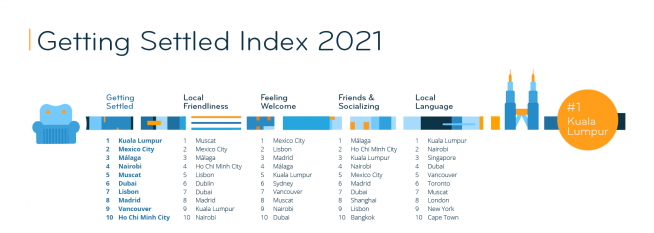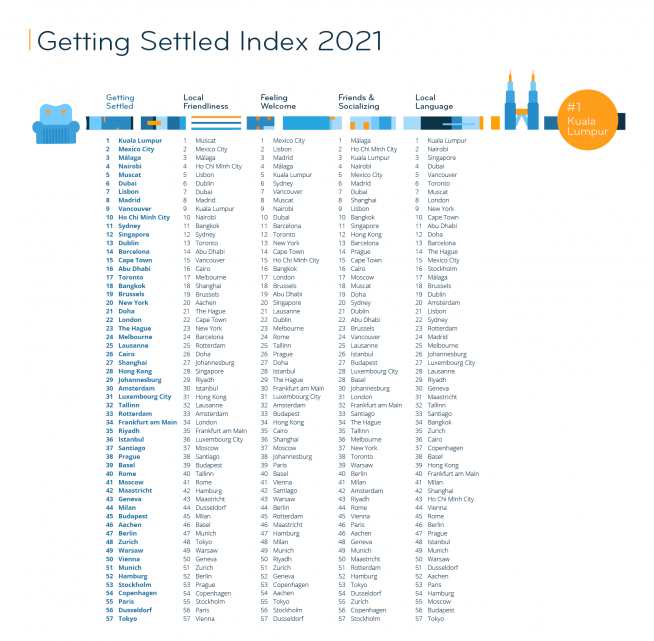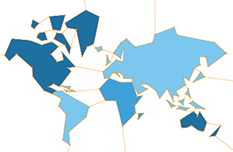Friendships & Social Life: Where It’s (Not) So Easy to Get Settled
- In 1st-placed Kuala Lumpur, an impressive 92% of expats agree that living there is easy even without local language skills.
- The culture in Mexico City (2nd) is easy to get used to, according to 93% of expats living there.
- Four in five respondents (80%) feel at home in Málaga (3rd).
- Three of the top 10 cities are located on the Iberian Peninsula: Málaga, Lisbon, and Madrid.
- Getting settled in Tokyo, Dusseldorf, and Paris is difficult, especially for nonnative speakers.
The Top 10
Methodology
The Getting Settled Index covers four subcategories: Local Friendliness, Feeling Welcome, Friends & Socializing, and Local Language. The rank of each city has been calculated based on two factors per subcategory: the friendliness of local residents in general and towards foreign residents, whether expats feel at home in their city and if it is easy to get used to the local culture, whether finding new friends is easy and expats’ happiness with their social life — and finally, the ease of learning the local language and of living in the city without speaking it. In 2021, 57 destinations make it into the Expat City Ranking, with a minimum sample size of 50 respondents per city.
Kuala Lumpur: A City for Friendships
Kuala Lumpur ranks first in the Getting Settled Index in 2021 — this is the third time that the city has made it to the top of this index. Expats are particularly impressed when it comes to making connections: 74% are happy with their social life in Kuala Lumpur, and close to two-thirds of expats in the city (65%) agree that it’s easy to find new friends there, compared to 57% and 48% globally. One Swiss expat describes Kuala Lumpur as “very international with lovely people”, and a survey respondent from India says that “making friends is not difficult”.
Kuala Lumpur also excels in the Local Language Subcategory. An impressive 92% of expats there believe that it’s easy to live in the city without speaking the local language (vs. just 54% globally), and 57% even agree completely. On the other hand, only a little more than half (53%) also consider the local language easy to learn — which is still more than the global average of 39%. It may not be a surprise that only 27% of expats in Kuala Lumpur speak the local language at least fairly well, while 73% say that they speak it only a little or not at all.
More than four in five expats in Kuala Lumpur (81%) rate the general friendliness of the local population positively (vs. 69% globally). And over three-quarters (77%) say that people in Kuala Lumpur are generally friendly towards foreign residents, compared to 67% globally.
What’s more, three-quarters (75%) feel right at home in the city (vs. 65% globally), and 78% find it easy to get used to the local culture (vs. 65% globally).
Feeling at Home in Mexico City
Mexico City occupies second place in the Getting Settled Index and also ranks eighth overall in the Expat City Ranking 2021. Just under nine in ten respondents in Mexico City (88%) say that people are generally friendly towards foreign residents; 48% even agree completely (vs. 67% and 25% globally). Just over four in five (82%) also rate the general friendliness of the population in Mexico City positively, and more than half (52%) even say it is very good (vs. 69% and 28% globally).
This may be part of the reason why 80% of expats say they feel at home in Mexico City (vs. 65% globally). An impressive 93% also agree that it’s easy to get used to the local culture, close to half (47%) even very much so (vs. 65% and 21% globally).
Moreover, 67% are happy with their social life in Mexico City (vs. 57% globally), while more than seven in ten expats (73%) believe that it’s easy to find new friends there (vs. 48% globally).
“The city is so beautiful, people are friendly, and the climate is perfect,” one expat from New Zealand says, and another survey respondent praises the “welcoming, warm people” and the “colorful culture”.
The situation is more challenging for expats when it comes to speaking the local language: only one-third (33%) say that it’s easy to live in Mexico City without speaking Spanish (vs. 54% globally). Fortunately, the local language seems to be easy to learn — 75% say so (vs. 39% globally). As a result, 78% of expats in Mexico City speak the local language at least fairly well, including 38% for whom it is their mother tongue.
A Great Social Life in Málaga
In the two years that Málaga made it into the ranking, it has consistently placed in the top 3 of the Getting Settled Index. Aside from occupying third place in the index, the city also ranks second overall in 2021 (see Best & Worst Cities for Expats in 2021). Over three in four expats in Málaga (78%) are happy with their social life, compared to 57% globally. More than two-thirds (69%) say that it’s easy to find new friends in Málaga (vs. 48% globally), and 20% very much so (vs. 14% globally).
Only Muscat and Mexico City outrank Málaga in the Local Friendliness Subcategory: 86% of expats in Málaga rate the general friendliness of the local residents positively (vs. 69% globally), and 82% say that people in the city are friendly towards foreign residents (vs. 67% globally). “If you make an effort and respect the local community, it is returned more than equally to you,” an expat from South Africa says.
Consequently, four in five expats in Málaga (80%) feel at home in the city, and 48% even agree completely (vs. 65% and 27% globally). Respondents also find that it’s easy to get used to the local culture — 80% say as much, and 37% even give the best possible rating (vs. 65% and 21% globally).
Respondents in Málaga are slightly more likely to say that the local language is easy to learn than the global average (44% vs. 39%). More than three in five expats (61%) speak it at least fairly well. On the other hand, a similar share (60%) also agree that it’s easy to live in Málaga without speaking the local language (vs. 54% globally).
Highlights from the Iberian Peninsula and the Middle East
Three of the top 10 cities in the Getting Settled Index can be found on the Iberian Peninsula. Aside from Málaga (3rd), Lisbon (7th) and Madrid (8th) rank in the top 10 as well. Although Barcelona (14th) misses the top 10, it still places in the top 15.
The majority of respondents in Lisbon (84%) and Madrid (85%) finds it easy to get used to the local culture in their city (vs. 65% globally). They are also happy with the general friendliness of the local population: 85% in Madrid and 80% in Lisbon say as much (vs. 69% globally). Although the cities don’t receive the same raving results when it comes to respondents’ happiness with their social life — 73% in Madrid and 68% in Lisbon rate this factor positively — their ratings are still higher than the global average of 57%.
Learning the local language doesn’t seem too hard for expats living in these cities; however, some find it challenging to get by without speaking it. This is especially true for expats in Madrid: nearly half of the respondents in the city (47%) disagree that it’s easy to get by without local language skills, compared to 29% globally. Over one in ten expats in Lisbon (12%) say the same.
Two Middle Eastern cities also join the top 10 of the index: Muscat (5th) and Dubai (6th). Both cities perform well across all of its factors. But while expats find it easy to get by without local language skills, especially in Dubai (76% agree very much with this factor, compared to 51% in Muscat and 21% worldwide), learning Arabic is a big challenge for respondents in both cities — 41% in Dubai and 37% in Muscat say as much.
Where the Local Language Makes It Hard to Get Settled
In 2021, Tokyo (57th), Dusseldorf (56th), and Paris (55th) occupy the bottom 3 of the Getting Settled Index.
Tokyo, which also ranks 53rd out of 57 overall, performs especially poorly when it comes to the language: 54% of respondents in the city say that it’s hard to live there without speaking Japanese, compared to a global average of 29%. Three out of four (75%) find the local language difficult to learn, too (vs. 42% globally).
Moreover, although just over half of the expats in Tokyo (51%) feel at home in the city, this is still 14 percentage points below the global average of 65%. Close to two in five (38%) find it difficult to get used to the local culture, 10% even very much so (vs. 18% and 5% globally). Finding friends in Tokyo is also a challenge for many expats: 51% struggle with making new friends there (vs. 32% globally) and 37% are dissatisfied with their social life in Tokyo (vs. 25% globally). “Expats are treated fine,” a US expat points out, “but they are never looked at as part of the Japanese community.”
Dusseldorf ranks 56th in the Getting Settled Index and 40th overall. More than a third of expats in Dusseldorf (36%) do not feel at home in the city, compared to a global average of only 19%. A similar share (37%) says that it’s difficult to get used to the local culture (vs. 18% globally). Just like in Tokyo, finding new friends can be a challenge — 51% say as much, compared to 32% globally. As a result, two in five respondents in Dusseldorf (40%) are dissatisfied with their social life in the city (vs. 25% globally). An expat from India agrees with these results, saying that it is “very difficult to socialize with the locals”.
Although Dusseldorf performs slightly better in the Local Friendliness Subcategory, nearly double the global average rate the general friendliness of the local residents negatively (30% vs. 16% globally). And one-third of survey respondents in Dusseldorf (33%) say people in the city are unfriendly towards foreign residents, compared to 18% globally.
The local language is a challenge for expats in Dusseldorf as well: 62% say that it’s not easy to learn German (vs. 42% globally), and 45% find it difficult to live in Dusseldorf without speaking the local language (vs. 29% globally).
Paris, which ranks 55th in the Getting Settled Index in 2021, has never performed well in this index. In fact, only Vienna receives worse results in the Local Friendliness Subcategory. Two in five expats in Paris (40%) disagree that people are generally friendly towards foreign residents, and more than twice the global average even give this factor the worst rating possible (11% vs. 5% globally). What’s more, 39% of expats also view Parisians as generally unfriendly (vs. 16% globally).
The majority of respondents in Paris (53%) says that it is difficult to find new friends in the city (vs. 32% globally). On the upside, though, 54% are happy with their social life, only slightly less than the global average of 57%.
When it comes to language skills, 56% of expats in Paris find it difficult to live there without speaking the local language, compared to 29% globally, and 54% say that French is not easy to learn (vs. 42% globally).
While 59% say that they feel at home in the city, over a quarter of expats in Paris (26%) find it difficult to get used to the local culture (vs. 18% negative responses globally). A survey respondent from Sudan shares that it’s “difficult integrating into French society”.
German-Speaking Countries Rank in the Bottom
Five of the cities ranking in the bottom 10 are located in German-speaking countries: Hamburg (52nd), Munich (51st), Vienna (50th), and Zurich (48th) join Dusseldorf (56th) in the bottom. Other cities in these countries do not achieve much better results: Berlin (47th) and Aachen (46th) only just miss the bottom 10.
These cities receive negative ratings across most factors of the index. Especially expats in Hamburg (63%), Munich (66%), and Vienna (54%) struggle with learning the local language and getting by without speaking German (52%, 39%, and 28%, respectively). Expats in Vienna and Zurich also don’t find the people generally friendly towards foreign residents (39% of survey respondents in both cities say as much) and rate the general friendliness of the locals negatively (43% and 27%, respectively). Respondents in Zurich (37%), Hamburg (30%), and Dusseldorf (40%) are generally unhappy with their social lives and struggle with finding friends, according to 57% of expats in Zurich, 45% in Hamburg, and 51% in Dusseldorf.
While getting by without local language skills is easier in Nordic cities, both Stockholm (53rd) and Copenhagen (54th) also find themselves in the bottom 10 of the index. Expats in both cities don’t feel at home there (34% and 30%) and struggle to get used to the local culture (37% and 30%). Finding new friends is also hard — 63% of expats in both cities say as much — although expats in Stockholm are a little unhappier with their social life (43% vs. 37% in Copenhagen). Respondents in Copenhagen disagree that people are generally friendly towards foreign residents (41%), while 46% of expats in Stockholm rate the general friendliness of the local residents negatively.





